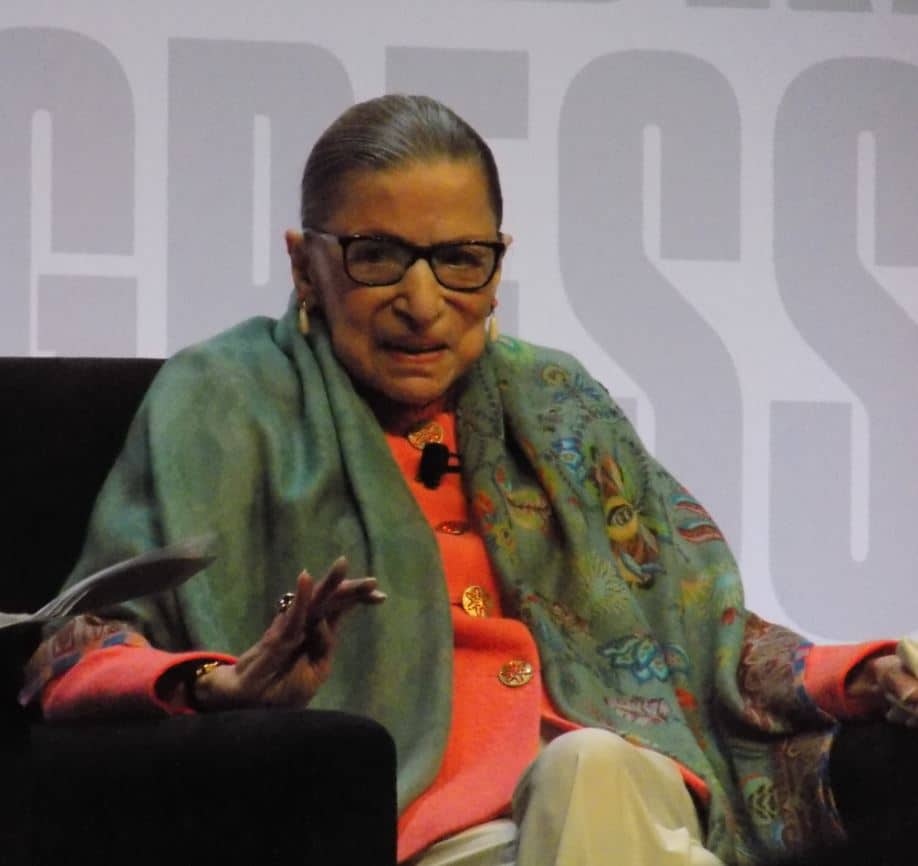Ginsburg Slams Partisan Gerrymandering Before Record Book Fest Audience

WASHINGTON – U.S. Supreme Court Justice Ruth Bader Ginsburg on Saturday told a record crowd that had turned out to see her at the National Book Festival that “something needs to be done about partisan gerrymandering.”
Ginsburg was responding to a question posed by NPR legal affairs reporter Nina Totenberg, who asked about a 2015 ruling by the court upholding the validity of an independent redistricting commission that had been established by voter referendum in Arizona.
In recent years, Ginsburg has more often than not been on the dissenting side of high court rulings, but in Arizona State Legislature v. Arizona Independent Redistricting Commission, the justice delivered the opinion of the court, in which Justices Anthony Kennedy, Stephen Breyer, Sonia Sotomayor, and Elena Kagan joined.
“The good voters of Arizona were tired of drawing district lines when there was very little incentive to vote because your district had been rigged,” Ginsburg said after the applause that followed her initial assessment had died down.
The way things were, she explained, the district one lived in was either going to be a Republican seat or a Democratic seat by design.
“So your vote didn’t count. That’s not the way a democracy should run,” Ginsburg said.
The justice noted that California was also at the forefront of the movement to have district lines drawn by nonpartisan independent commissions, but it was a legal challenge in Arizona that finally brought the matter to the Supreme Court.
In 2000, Arizona voters approved a ballot initiative that transferred redistricting power to an independent commission. The state legislature sued, contending that it alone could draw the maps under the constitutional provision providing that each state’s legislature should prescribe “the times, places and manner of holding elections.”
“State legislators would not willingly give up the monopoly they had on redistricting, so it came down to the good people of the state to say this should be done,” she said. “This presented a Constitutional question [for the Supreme Court to decide] because the Constitution says redistricting will be done by the legislature.
“Some of my colleagues said ‘legislature’ means ‘legislature.’ It doesn’t mean ‘the people.’ But to me it seemed quite clear that the state, by having a referendum process, had made the people the legislature for this purpose,” Ginsburg said.
“That’s what referendum are for – they give the deciding voice to ‘We The People’ and not the partisan members of the legislature, and I think after that case other states, whose constitutions allowed for ballot initiatives, were encouraged to hold referendums on this issue,” she said.
But Totenberg was not done quizzing Ginsburg about the issue. She reminded the audience that Chief Justice John Roberts had argued vigorously against Ginsburg’s position in the Arizona case.
In a dissent joined by Justices Antonin Scalia, Clarence Thomas, and Samuel Alito, Roberts wrote that the phrase “the legislature” in the Elections Clause is unambiguous, referring to a representative body.
“When seeking to discern the meaning of a word in the Constitution, there is no better dictionary than the rest of the Constitution itself,” the chief justice wrote.
“Now fast-forward to this year,” Totenberg said. “A 5-4 Conservative majority on the Court ruled, essentially, that the voters have no ability to challenge extreme partisan gerrymanders in court.
“But at the same time, the majority opinion written by the chief justice seems to suggest that other remedies, like independent redistricting commissions, provide alternative ways to address the problem of partisanship in redistricting,” she continued.
“Could you please explain what’s going on here?” Totenberg asked. “Have the court’s conservatives changed their minds about redistricting? Is this just window dressing?”
Ginsburg turned to her inquisitor with a smile.
“As one lives, one learns,” she said. “So I think what the chief justice has learned is that he was wrong in the Arizona case.”
























